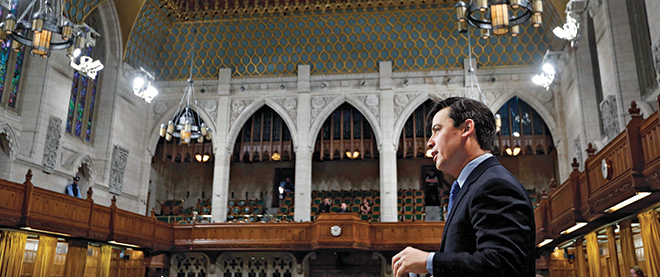Michael Chong’s Reform Act and the art of the possible
What would Otto Von Bismarck say?
on Parliament Hill November 2011, 2011.
Share

“Politics is the art of the possible, the attainable—the art of the next best.”
It’s always a bit dangerous to start citing things that have apparently been said by wise men and women long ago, but I choose to believe Otto von Bismarck said this. And if somehow he didn’t, I choose to believe that someone should have.
Yesterday, Michael Chong announced his desire to see two further changes made to the Reform Act, his private member’s bill that arrived nine months ago with the hope that now, the individual MP might reclaim some of the power that has been accumulated by party leaders. Andrew Coyne, whose passion in this regard is admirable, despaired. The Globe‘s editorial board is more optimistic. Chris Selley notes that the onus remains on the MPs themselves to do something about their current lot.
In an email this afternoon to subscribers to the mailing list of the Friends of the Reform Act, campaign director Dave Meslin offers three reasons to support Chong’s proposals.
1) Listening and leading by example. The proposed amendments are the result of extensive consultations, both with members of the public and with MPs from all parties. Often in politics, we accuse politicians of ‘backing down’ or ‘flip-flopping’ when they change their opinion on something. But most Canadians are hungry for a different kind of politics, where we encourage MPs to listen, to be responsive and to work toward consensus. Michael Chong is leading by example.
2) Delicate balance of four interests. The Reform Act is trying to re-balance power in the House of Commons. It’s a hard thing to do, because there are four different places where power resides in our democracy: the party leader, the party caucus, the party membership and, of course, the voters. To make our system work better, all four interests need to be able to exercise power in the right amount, in the right way, at the right time. We believe these revisions do a better job of finding that balance.
3) Flexibility. There is no one-size-fits-all solution for Canada’s political parties. Michael’s revisions give each party the flexibility to design their own internal rules that empower their MPs and their membership.
So that’s the spin.
There is, of course, something to be said for listening, balance and flexibility. Those are of practical value. And I suppose it matters quite a bit here whether you think either of the first two versions of the Reform Act could have received the support necessary to pass both the House and Senate. If not—if these changes were necessary to get some kind of bill passed—and if you wish that the earlier versions had passed, then you have to decide whether this something is better than nothing.
I think I would’ve liked the first version of the Reform Act to have passed, if only to see what would have happened. (Note: When the economy started to go sideways a few years ago and people started worrying that the stock market or our entire economic system was going to collapse, I was the guy thinking, “Oh yeah? I kind of want to see what that would be like.”) But I also think clearing as much space for MPs to exist as reasonably independent entities is a worthy goal, and that without reasonably independent MPs, it is impossible for the House to accomplish its primary purpose of holding the government to account. And that, beyond simply hoping that ours MPs might start behaving differently, there is much to be said for changing the actual rules around which our Parliament is organized.
But the Reform Act was never going to fix everything. It was always, at best, a step toward maybe fixing everything eventually—one that probably would have been subject to counter-moves by those who prefer the status quo. It would have had to have been followed by other changes (ask me about committee reform!). Maybe it would have encouraged those changes. But even its outright defeat would not have prevented those changes.
In its imagined form, it still leaves open the possibility of creating real change. Which is something. Which is perhaps better than nothing. Which is all perhaps a reminder that politics is the art of the possible.
Which is not to say that the fierce demand for more and better and different is silly or unreasonable. It is, one hopes, what keeps pushing outward the boundaries of what is possible—or, at least, what keeps those boundaries from closing in any further.
And so the eternal, futile quest for perfect democracy goes on.